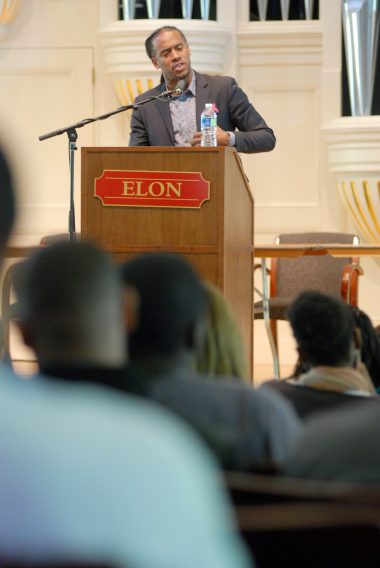“Diversity” has become a buzzword on college campuses that misses a larger point, said activist and BET personality Jeff Johnson, who visited campus Saturday for Elon University’s inaugural Diversity Leadership Conference. More should be done to foster greater community, he said, and responsibility for that rests with student leaders.

Johnson served as the keynote speaker for the two-day conference featuring workshops that explored race, disabilities, language and concepts of identity. With presentations from faculty and staff from Elon and UNCG, 220 students, faculty and staff from colleges in North Carolina and Virginia took part in the event.
“I thought the point of diversity was to further value what these people who are different bring to the table,” the award-winning journalist and activist told a crowded Whitley Auditorium. “The better buzzword, really, is how do we build community?
“If you just want diversity, I believe you’re wasting your time. Students of this generation should be challenging universities to go beyond numbers and quotas and programs that make people feel they have to be together.”
Johnson has spent much of the past decade “merging the worlds of politics and popular culture” through work with People for the American Way, the NAACP and his appointment by Russell Simmons as vice president of the Hip Hop Summit Action Network.
He won a 2008 NABJ Salute to Excellence Award for BET’s “Life & Death in Darfur, Jeff Johnson Reports” series. Johnson has often been quoted in mainstream media on issues related to race, politics, pop culture and class.
The 45-minute talk, which was followed by about a dozen audience questions, touched on leadership as well as diversity. Johnson told stories of his days as a college student at the University of Toledo, where his political acumen led to his election as the school’s first African-American student government president.
The number of people who attend a planned event isn’t important, he said. It is better to do something that makes a change that no one knows about than to hold a meeting or a program where everyone knows it takes place, but nothing improves as a result. “It matters how many people’s lives you affect with the work you do,” Johnson said.
He also challenged audience members to take risks when trying to effect change. Even failure can be valuable, Johnson said.
“Falling on your face is still moving further ahead than standing on your feet,” he said.
Ten Elon students from the Multicultural Student Council organized the Diversity Leadership Conference, which took place in the Oaks, McKinnon Hall and Lindner Hall from April 9-10. Elon staff members hosted workshops on Saturday, along with staff from UNC-Greensboro, Pfeiffer University and from Dyce Consulting, to examine biases and perceptions related to race, disability, language and national origins.
“More than anything, I hope that attendees walked away with a deeper understanding of what diversity is and how it effects everyone,” said Melissa Jordan, assistant director of the Multicultural Center. “The goal of the conference was to empower the attendees to reflect on their own perspectives and challenge themselves to be a true advocates for diversity. Once a person has become aware, it is there duty to encourage that same awareness in others.”
Student organizers have already started discussions for the 2011 conference.


